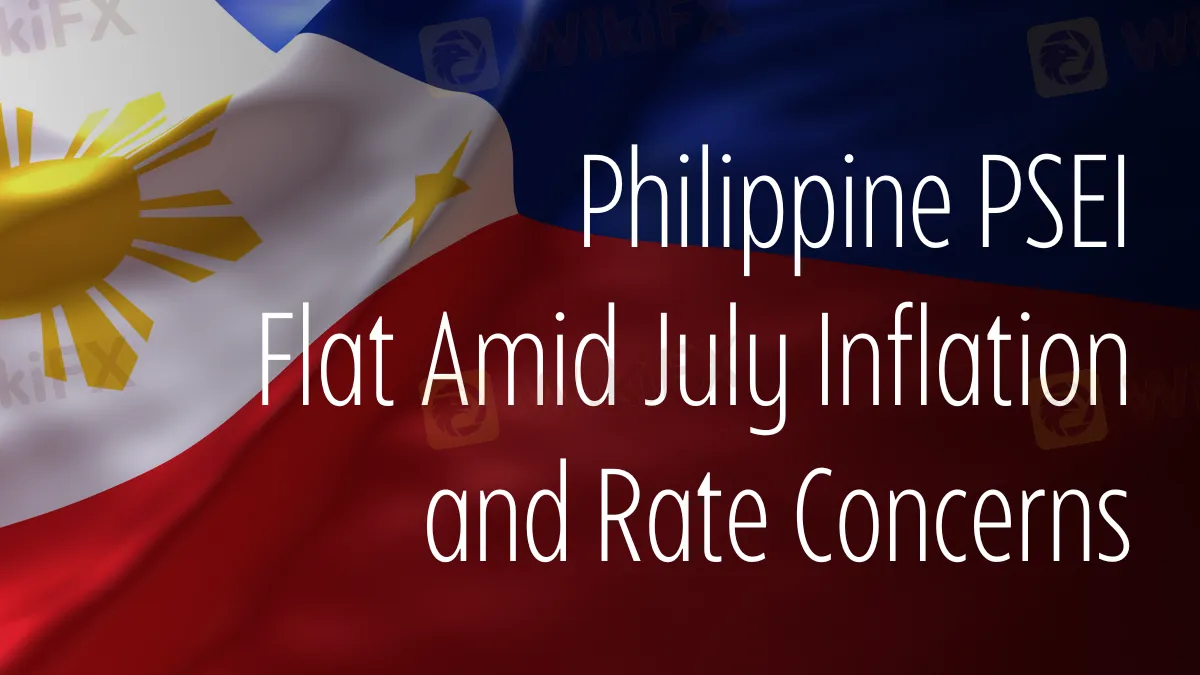简体中文
繁體中文
English
Pусский
日本語
ภาษาไทย
Tiếng Việt
Bahasa Indonesia
Español
हिन्दी
Filippiiniläinen
Français
Deutsch
Português
Türkçe
한국어
العربية
Philippine PSEI Flat Amid July Inflation and Rate Concerns
Abstract:Philippine PSEI ends flat as July inflation surge and rate hike concerns weigh on investor sentiment. Broader All Shares Index gains slightly.

Tuesday's closing value for Philippine shares was flat, rebounding somewhat from one of the sharpest drops of the year as investors considered the possibility of higher interest rates following July inflation.
With only 0.02 percent or 1.49 points, the benchmark Philippine Stock Exchange Index (PSEi) moved little to close the day at 6,433.24. By comparison, the larger All Shares Index gained just 0.13 percent, climbing 4.47 points to end at 3, 520.94. With P5.12 billion worth of traded 419.01 million shares, the trading session revealed a day of wary investor activity.
After Monday's notable 2.58 percent decline, the market began strong as buyers looked for deals. But last-minute profit-taking erased these early profits. Researching at Philstocks Financial Inc., Mikhail Plopenio pointed out that the negative attitude was partially caused by bad signals from the United States, where important indices dropped under recession concerns, thus affecting local investor behavior.
The comments of Bangko Sentral ng Pilipinas (BSP) Governor Eli Remolona Jr. further demoralized investor hope. After July's inflation rate exceeded estimates, he said, a possible interest rate drop was now “less likely.” Following the nation's July inflation rate rising to 4.4 percent year-on-year, beyond the government's goal range of 2 percent to 4 percent, this declaration followed. Rising prices in food, utilities, transportation, and housing as well as other factors contributed to the surge and raised questions of continuous high inflation.

Performance in many different fields was uneven. With a 0.60 percent increase, property companies topped the gainers; the mining and oil sectors had the most sharp drop, down 1.76 percent. Enrique Razon Jr.'s International Container Terminal Services Inc. stayed the same at P348 per share among the most traded equities.
Closing at P98.10, Universal Robina Corp. saw a notable loss of 6.57 percent. Managing a 0.72 percent rise, BDO Unibank Inc. finished at P140. Ayala Land Inc. did likewise, closing at P28.55 with a 1.42 percent gain. Metropolitan Bank and Trust Co. dropped by 1.22 percent, nevertheless, to P65.
Other noteworthy moves were Ayala Corp., which climbed 1.29 percent to P588.50, and SM Investments Corp., which fell 0.45 percent to P880. Closing at P27.85, SM Prime Holdings Inc. saw a little drop of 0.18 percent. Wilcon Depot Inc. was down 1.20 percent to P16.50; Bank of the Philippine Islands down 0.68 percent to P117.40.
Driven by internal inflation issues and outside economic pressures, the uneven sector performance and cautious investor attitude highlight the present volatility of the market. While investors wait for further developments, a major determinant of market movements still is the possibility of higher interest rates.
Stay updated on the latest market trends and investor insights! Visit WikiFX's news page now for in-depth analysis and real-time updates on the Philippine Stock Exchange and more.

Disclaimer:
The views in this article only represent the author's personal views, and do not constitute investment advice on this platform. This platform does not guarantee the accuracy, completeness and timeliness of the information in the article, and will not be liable for any loss caused by the use of or reliance on the information in the article.
Read more

Authorities Alert: MAS Impersonation Scam Hits Singapore
MAS scam alert: Scammers impersonate officials, causing $614K losses in Singapore since March 2025. Learn how to spot and avoid this impersonation scam.

Billboard Warns of Crypto Scams Using Its Name – Stay Alert!
Billboard warns against fake crypto scams using its brand. Learn how to spot fraud and protect yourself from fake promotions.

The Impact of Interest Rate Decisions on the Forex Market
Interest rate changes determine currency attractiveness, influencing capital flows and exchange rate trends. Understanding this mechanism helps investors navigate the forex market effectively.

Rising WhatsApp Scams Highlight Need for Stronger User Protections
UK consumers lose £2,437 on average to WhatsApp scams. Revolut demands stricter verification and AI monitoring to combat rising fraud on Meta platforms.
WikiFX Broker
Latest News
TradingView Brings Live Market Charts to Telegram Users with New Mini App
Trump tariffs: How will India navigate a world on the brink of a trade war?
Interactive Brokers Launches Forecast Contracts in Canada for Market Predictions
Authorities Alert: MAS Impersonation Scam Hits Singapore
Stocks fall again as Trump tariff jitters continue
INFINOX Partners with Acelerador Racing for Porsche Cup Brazil 2025
Regulatory Failures Lead to $150,000 Fine for Thurston Springer
April Forex Trends: EUR/USD, GBP/USD, USD/JPY, AUD/USD, USD/CAD Insights
March Oil Production Declines: How Is the Market Reacting?
Georgia Man Charged in Danbury Kidnapping and Crypto Extortion Plot
Currency Calculator







